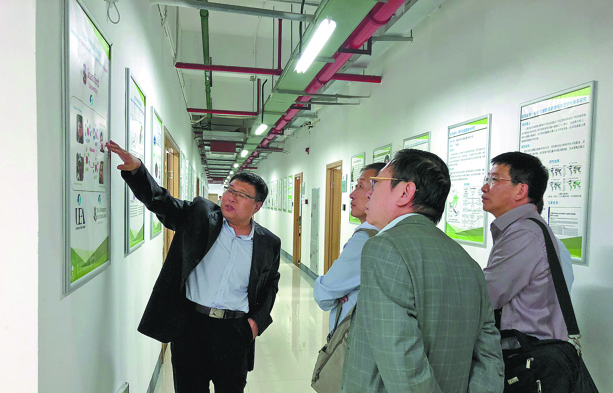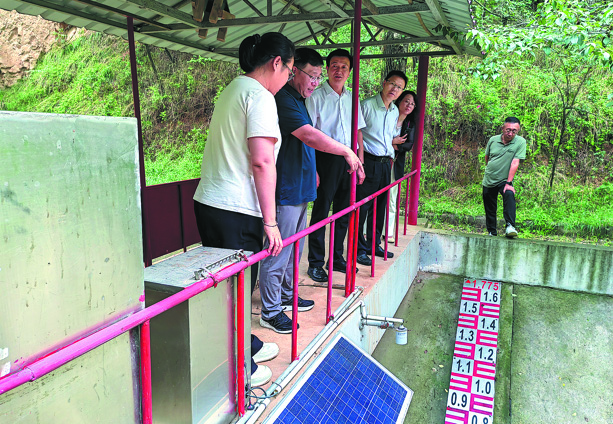China-Africa cooperation vital to tackle global water scarcity, expert says

Liu Junguo, president of North China University of Water Resources and Electric Power, introduces the university's laboratories to a group of researchers.CHINA DAILY
The growing cooperation between China and Africa may offer a promising solution to tackle the possible water scarcity that may occur in the mid-21st century in Africa, according to an expert.
Sharing his views on the China-Africa partnership for global water scarcity, Liu Junguo, president of North China University of Water Resources and Electric Power, or NCWU, said China has accumulated rich experience in addressing water scarcity, which holds significant value for the African region.
In his academic paper titled Timing the First Emergence and Disappearance of Global Water Scarcity, which was published in Nature Communications in August, Liu assessed the first occurrence and potential disappearance time of water scarcity worldwide after a detailed analysis of global water resources from 1901 to 2090.
The results showed that Asia and Africa are the main regions where water scarcity first emerges, with China expected to be one of the few countries where water scarcity gradually eases after 2050. However, by the mid-21st century, Africa is projected to become a major region where water scarcity emerges, particularly in East and West Africa.
The research utilized six global hydrological models and various climate and population scenarios to analyze the historical and future trends of global water scarcity. The findings reveal that global water scarcity, primarily driven by population growth and concentrated in regions such as China, India and East Africa, has been worsening since the 1930s.

Liu is in a field investigation into the Lancang-Mekong River Basin in Laos.CHINA DAILY
The study calls for heightened attention from governments and international organizations to address water resource management issues in Africa, urging effective policies to tackle the potential future water scarcity challenges.
"China has effectively alleviated water scarcity issues in northern regions through large-scale infrastructure projects such as the South-to-North Water Diversion Project. Similar interregional water transfer projects could be implemented in Africa to address uneven water distribution among regions," Liu said.
"China has made significant progress in improving agricultural irrigation efficiency. Over the past decade, by promoting water-saving irrigation technologies such as drip irrigation and sprinkler irrigation, China has increased agricultural water use efficiency by around 30 to 40 percent, which is crucial for African countries dependent on agriculture. Additionally, China has raised societal water conservation awareness through policy incentives and public education. These experiences can assist African countries in enhancing water resource utilization efficiency through technological innovation and policy adjustments to alleviate water scarcity issues," he said.
"The international community needs to engage in deep cooperation, especially by strengthening China-Africa cooperation, to effectively address water scarcity issues in Asia and Africa," he said.
Liu urged the international community to increase investments in water resource management infrastructure, particularly in the underdeveloped regions of Africa and Asia. The global community should also promote technology transfer and knowledge sharing to help introduce advanced water resource management technologies and experiences into Asia and Africa. People can use remote sensing technology to monitor water resources, conduct three-dimensional water scarcity assessments, implement stepwise ecological restoration models to revive river and lake ecosystems and deploy smart water management systems to improve the efficiency of water resource management.

Liu works with a group of researchers in an investigation at Xifeng Soil and Water Conservation Scientific Experimental Station of the Yellow River Conservancy Commission. CHINA DAILY
"China's successful experiences in water resource management and water-saving technologies can provide valuable insights for African countries. Through education and technical training, China-Africa cooperation can enhance the water resource management capabilities of African countries and drive regional sustainable development. This collaboration will not only help Africa and Asia tackle water resource challenges but also contribute to achieving global sustainable development goals," he said.
The research was funded by the National Natural Science Foundation of China, Henan Provincial Key Laboratory of Hydrosphere and Watershed Water Security, and the Strategic Priority Research Program of the Chinese Academy of Sciences. Collaborating institutions included the Southern University of Science and Technology, King Abdullah University of Science and Technology, Aalto University, the University of Nottingham, 2w2e Environmental Consulting GmbH, Michigan State University and the Laboratory for Climate and Environmental Sciences in France.
Dedicated to publishing scientifically significant and interdisciplinary research of global importance, Nature Communications is one of the most influential and authoritative scientific journals internationally. The publication of Liu's study marks a breakthrough in the research work of NCWU and showcases its influence in the international academic community. It encouraged the university to promote technological innovation and advance the work under the national Double First-Class initiative.
NCWU is located in Zhengzhou, Henan province. It has been rated as the Henan Provincial Distinctive Key University and a Double First-Class university in the province. It now has 68 full-time undergraduate majors, 38 master's degree-granting first-level disciplines, four doctoral degree-granting first-level disciplines, and three centers for postdoctoral studies. NCWU has established friendly cooperative relations with more than 130 overseas universities. It is a member of the World Water Council, a member of the Asia Water Council, a member of the Asia-Pacific Economic Cooperation Energy Partnership Network and a European Union talent training partner.
Web editors: Zhang Rui, Wang Zongwen
